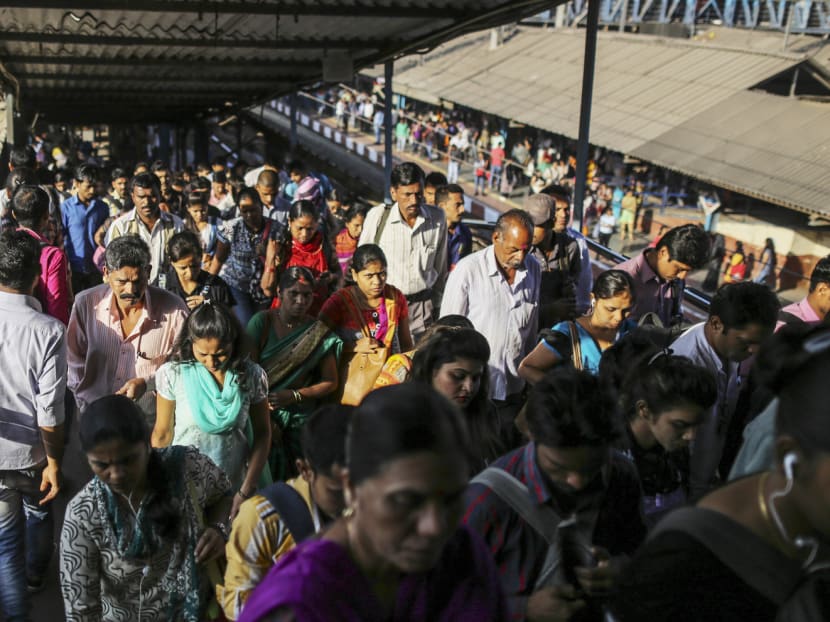Mumbai votes as India’s sales tax threatens revenue
MUMBAI — India’s financial hub went to the polls yesterday to elect a civic administration that will shepherd it through an expected fall in revenue amid the roll-out of a national sales tax.

Commuters walking along a bridge at the Kurla railway station in Mumbai. Yesterday’s elections mark a political transition after the ruling Shiv Sena-BJP alliance split earlier this year. Photo: Bloomberg
MUMBAI — India’s financial hub went to the polls yesterday to elect a civic administration that will shepherd it through an expected fall in revenue amid the roll-out of a national sales tax.
At stake is the municipality’s ability to provide better living standards in Mumbai — key to the success of Prime Minister Narendra Modi’s plan to compete with the likes of Singapore by offering foreign entrepreneurs residency rights.
The Municipal Corporation of Greater Mumbai (MCGM) will lose the ability to collect an entry tax on goods, which contributes about a third of its revenue, once Mr Modi implements the goods and services tax, due by September.
Smaller earnings will limit the authorities’ ability to build flyovers and water pipelines in one of the world’s most populous cities that is a gateway to overseas investment, and was once compared with Shanghai.
While states will be compensated for tax losses, Mumbai risks losing allocations as the city’s dominant party broke a two-decade alliance with Mr Modi’s Bharatiya Janata Party (BJP), which controls both the federal and state administrations.
“We are talking about a city whose budget is bigger than many of the Indian states,” said Mr Devendra Kumar Pant, chief economist at India Ratings & Research, the local unit of ratings agency Fitch.
“There’s a tremendous pressure on civic amenities in cities across the globe as more and more people migrate in search of newer and better opportunities. The cities can’t stop that, but they can ease the stress by planning at least 10 years in advance.”
Of Mumbai’s 371 billion rupees (S$7.9 billion) budgeted spending for the year through March, most goes towards salaries and loans. Revenue is mostly from a levy on goods entering the city.
The MCGM — called one of the most corrupt institutions in India by the Bombay High Court in 2011 — is often accused of mismanaging funds amid an influx of immigrants. Residents face severe water shortages, traffic jams are rampant, and streets in the coastal megacity are flooded almost every year during the monsoon downpours.
“We have about 9.1 million voters this time, of which around 400,000 will be exercising their right for the first time,” MCGM spokesman Vijay Khabale-Patil said.
“The municipal administration has tried its best to awaken the citizens about this right, and we expect the turnout this time to be better than the past occurrences.”
He declined to comment on how the local body planned to fight the perception that it is corrupt and lacks accountability.
Yesterday’s elections mark a political transition after the ruling Shiv Sena-BJP alliance split earlier this year. The regional Shiv Sena is the dominant partner in the city, while the BJP holds the national as well as state governments.
Both parties contested the polls separately, and results are due on Thursday.
“Even if these are local polls, the electorate votes with the performance of the state and the central governments at the back of his or her mind,” said BJP spokesman Madhav Bhandari.
His government would aim to make it easier to do business in Mumbai, lower land prices, and generate income from garbage and waste-water recycling, he said.
About half the size of New York but home to 30 per cent more people, Mumbai is by far South Asia’s most globalised economy, according to JPMorgan Chase. After being ceded by the Portuguese to the British in 1661, it became a trade hub and today houses Asia’s oldest stock exchange, India’s central bank, and Bollywood, the nation’s most visible cultural export.
Mumbai accounts for about 30 per cent of India’s foreign direct investment, 60 per cent of customs duty collections, and 40 per cent of income tax.
“Mumbai contributes around 2 trillion rupees in taxes to the nation, and most of it is distributed to the economically and financially less-developed regions,” said Shiv Sena spokesman Anil Parab.
“We are demanding the centre gives us at least 25 per cent share of the outgo to cope with the issues related to people migrating to the city for better opportunities,” he added. BLOOMBERG





